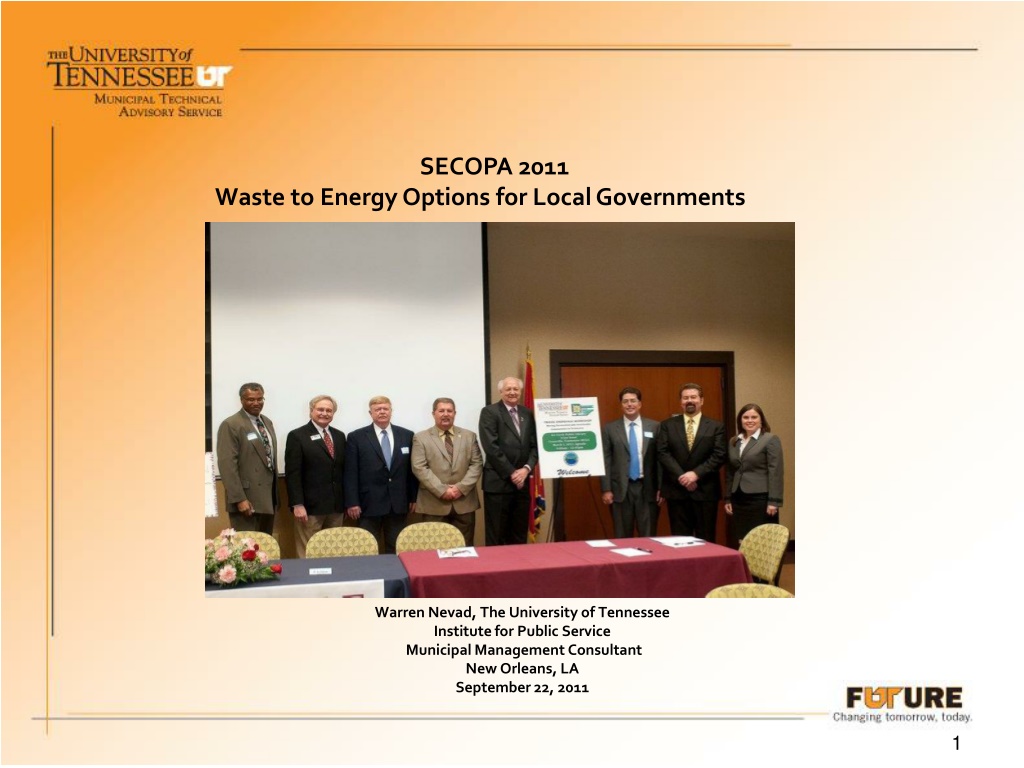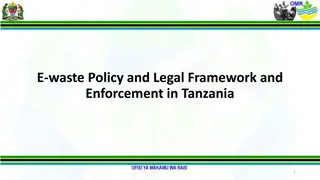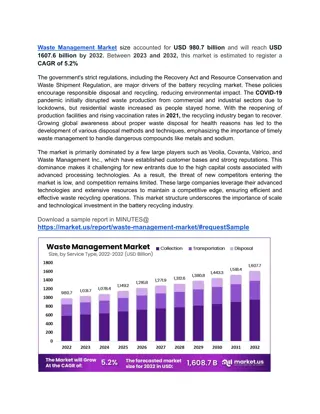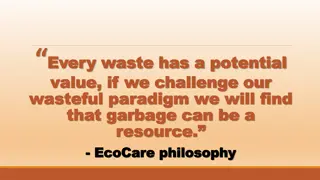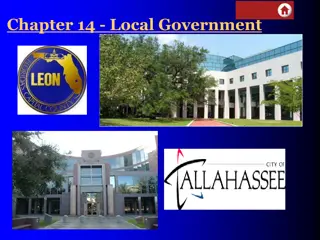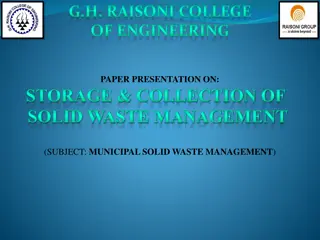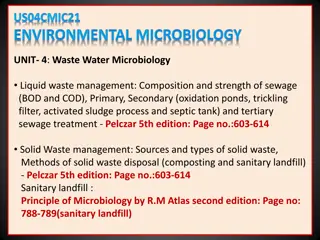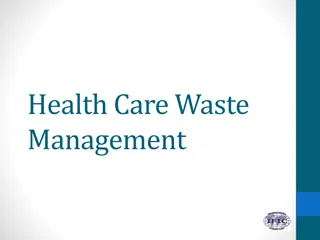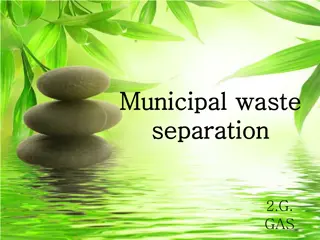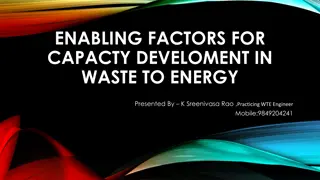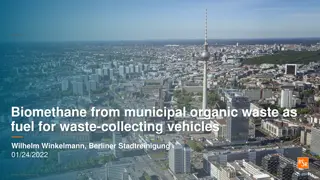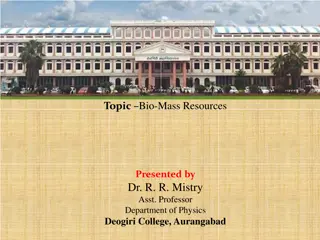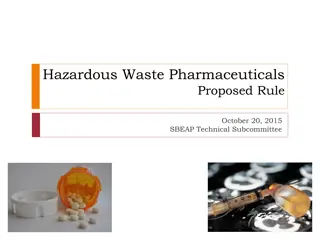Waste to Energy Options for Local Governments
Waste to Energy Options for Local Governments explores various technologies available for local governments to convert waste into energy sources such as biodiesel, green diesel, and ethanol. The presentation covers examples of projects, companies at the forefront, and the benefits including energy independence and reduced greenhouse gas emissions. It also discusses the requirements for implementing waste-to-energy solutions and strategies to garner support from relevant organizations.
Download Presentation

Please find below an Image/Link to download the presentation.
The content on the website is provided AS IS for your information and personal use only. It may not be sold, licensed, or shared on other websites without obtaining consent from the author. Download presentation by click this link. If you encounter any issues during the download, it is possible that the publisher has removed the file from their server.
E N D
Presentation Transcript
Waste to Energy Options for Local Governments SECOPA 2011 Warren Nevad, The University of Tennessee Institute for Public Service Municipal Management Consultant New Orleans, LA September 22, 2011 1
Outline of Presentation Waste to Energy Technologies Waste to alternative transportation fuels Waste to biopower Examples of projects/Companies-forefront Benefits energy independence, less greenhouse gases financial benefits operating/capital What s needed FLIP Feedstock, Land, Interconnect, Power purchase agreement How to galvanize support Tennessee Renewable Energy & Economic Dev. Council (TREEDC)/
Waste to Energy Technologies Available for local governments Technology : Municipal Wastes to Biodiesel Process Collect waste vegetable cooking oil from restaurants/households and mix to produce biodiesel- Companies: Biodiesel Logic builds a 55 gal/250 gal processors - produce 2 batches of biodiesel per day. Processors range from $60 K to $100 K. Local Governments: Hoover AL produces 30,000 gal a year at less than 1.00 per gallon. Other cities - Gadsden, AL, Crossville, TN, Kokomo, IN Benefits diversion of grease from wastewater which reduces clogged lines and saves on overtime cost co-prod. glycerin car soap. emergency supplies
Waste to Energy Technologies Available for local governments Technology : Municipal Wastes to Green Diesel Process wastes are sorted and microwaved into a synthetic drop in diesel no emissions Companies: 49 Green: 30 K tons biomass to 2.4 million gal. of green diesel Local Governments: none yet firm works out of Jackson, MO and is seeking patent from Denmark. Benefits wastes are diverted from landfill saving on capital dollars for expansion
Waste to Energy Technologies Available for local governments Technology : Municipal Wastes to Ethanol Process wastes are gasified using a thermochemical process to create syngas and bacteria is injected to ferment gas into ethanol. Companies: Coskata,, Enerekem, Fulcrum, Ineos, Powers Energy Local Governments: construction in Indian River County, FL Lake County, Indiana- pending,. McCarran, Nevada Fulcrum 90K to 10.5 mil gal- 2012 Benefits wastes are diverted from landfill saving on capital dollars for expansion, cheap feedstock to produce ethanol
Waste to Energy Technologies Available for local governments Technology : Agriculture/Municipal Wastes to Ethanol Process crop wastes/wood residues/switchgrass enzymes are used to break down sugars from lignin yeasts are added to slurry of sugars to ferment into alcohol. Companies: Dupont Danisco, Poet Local Governments: pilot plant in Vonore, TN, Scotland, South Dakota Benefits wastes are diverted from landfill saving on capital dollars for expansion, low costs of feedstocks to produce ethanol
Wastes to biopower- Co products from Ethanol production Anaerobic Digesters: Turning waste into power. Lignin from the enzymatic hydrolysis process will go to the anaerobic digesters to produce biogas which displaces natural gas. Excess heat from gasification process will produce high pressure steam running through a turbine generator to create biopower Covanta 154K tons of biomass will produce 17.5 mw of power for 10,000 homes. Wastewater sludge to biopower Wastewater sludge can generate clean energy with an anaerobic digester or a gasifier that can mix wood chips with sludge to create a syngas which can be used to fire up a boiler or injected into a natural gas line Seminole Florida, feasibility study Covington, TN
Landfill Gases Technology : Landfill wastes to power generation Process household garbage rots and creates methane which is piped to turbine generators which produce electricity and used to provide power to public buildings Companies: Waste Management, Allied, Local Governments: Memphis, Johnson City and Alcoa,TN Benefits , zero costs of feedstocks to produce clean energy. Landfill waste is already there.
Tennessee Renewable Energy & Economic Development Council 1. Chartered by state on Aug 21, 2008: www.treedc.us 2. Formed by UT-MTAS, 4 mayors, small Knoxville firm and UT President Emeritus Dr. Joe Johnson 3. Mission promote renewable energy with economic development 4. Members 65 cities, 8 counties in east, middle and west TN. TVA, ORNL, USDA Rural Development, TN Dept of Ag, ECOtality 5. Activities : Assisted in biodiesel recycling/production for Crossville and Clarksville / Held 9 forums 800+ attendees business networking across state technology providers give presentations
TREEDC Business Plan 1. Network: Organize statewide community forums to bring together stakeholders. Get the name out there! Create a knowledge base. TREEDC Business Plan for Local Governments 2. Grants: Partner with Dev. Districts and USDA Rural dev. to seek renewable energy related grants : feasibility studies/project participation 3. Technical Assistance: Through UT - provide a needed resource for helping local govts use alternative fuels biodiesel and bioenergy. 4. Economic Development: Accelerate market development of biofuels by assisting with UT/State Initiatives Cellulosic ethanol and solar 5. Advocacy/Education: Be the voice for innovation and job creation for all-
You can do it! Identify someone in the state others cherish and respect. Ask that person to be your figurehead. Start small. Involve key Mayors in a specific region and if that works out well, then go statewide. Engage the business community. In our experience, knowing that local elected officials will be attending a forum is the motivating factor for business involvement. Get the academic community and other resource agencies involved by asking them to co-host events.
Conclusion 1. We covered various technologies that could benefit local governments 2. Reviewed benefits and case examples 3. TREEDC 4. How to galvanize support 5. Enjoy the process
Contact Information: warren.nevad@tennessee.edu 865-974-9839 www.ips.tennessee.edu www.mtas.tennessee.edu www.treedc.us 14
